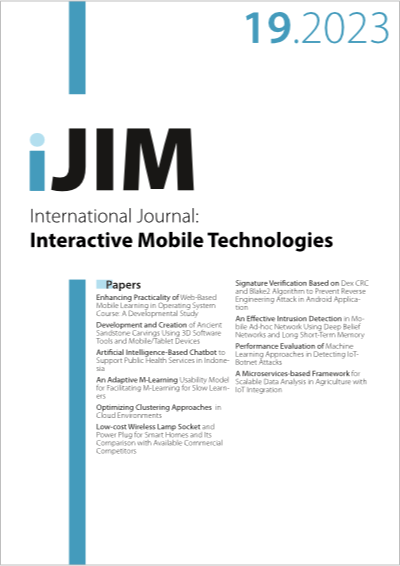An Adaptive M-Learning Usability Model for Facilitating M-Learning for Slow Learners
DOI:
https://doi.org/10.3991/ijim.v17i19.42153Keywords:
Mobile learning apps, adaptive approach, personalized recommendations, virtual environment, M- learning, M- learning standards, facilitation of mobile learning, mobile technology supportAbstract
Mobile devices have evolved from communication tools to versatile platforms for various purposes, including learning. Usability is crucial for practical mobile learning applications, ensuring ease of use and expected performance. However, existing research on mobile educational apps has primarily focused on typical learners, neglecting the specific requirements of slow learners who face cognitive limitations. In this work, we fill this research gap by proposing an adaptable learning-oriented usability model (ALUM) for mobile learning apps specifically tailored to support slow learners. The research conducts a detailed usability analysis and systematic review to identify the problems users face and investigate how slow learners respond to learning apps in terms of efficiency, effectiveness, satisfaction, and learning outcomes. Twenty-four participants classified as slow learners evaluated the usability of 25 HTML-based learning apps. The evaluation revealed critical deficiencies in existing learning apps concerning the needs of slow learners, particularly in user-friendliness and learnability, leading to their dissatisfaction. We propose a model that leverages a hybrid recommendation system to address these challenges. The model incorporates a navigational graph, ontology, and item matrix to provide personalized topic recommendations, tailoring the content and delivery of educational materials based on individual needs and preferences. By enhancing the learning experience for slow learners, the proposed model aims to improve their learning outcomes. This research bridges the gap between academic research and practical applications in interactive mobile technologies. The adaptable learning-oriented usability model presented in this paper offers a framework for supporting slow learners, emphasizing its essential components and their interactions to enhance the learning outcomes for this user group.
Downloads
Published
How to Cite
Issue
Section
License
Copyright (c) 2023 jawad ul Hassan, Malik Muhammad Saad Missen, Amnah Firdous, Arfa Maham, Amna Ikram

This work is licensed under a Creative Commons Attribution 4.0 International License.



